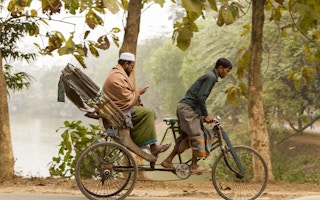Bangladesh has become known as one of the most vulnerable countries to climate change. This refrain is repeated endlessly by our leaders and representatives. It is also the way the international media sees Bangladesh.
For example, a recent series of documentaries on climate change impacts around the world hosted by celebrities in the United States, called “Year of Living Dangerously,” included one segment on Bangladesh that highlighted the country’s vulnerability to the adverse impacts of climate change.
While this story is undoubtedly true, it is no longer the only story about climate change and Bangladesh. I would argue that it is by now an out-of date-story and it’s time for a new narrative: that Bangladesh is at the forefront of tackling the adverse impacts of climate change.
In scientific and development discourse the vulnerability of countries, communities and systems to the adverse impacts of climate change often is used to illustrate their lack of resilience. In other words, countries and communities that are highly vulnerable are generally deemed to have low resilience, despite their higher need for it. Vulnerability and resilience are seen like a see-saw where high vulnerability equals low resilience and low vulnerability equals high resilience.
I would argue that while this may be true in many cases, Bangladesh is the exception to this rule. In other words, Bangladesh is both highly vulnerable to the physical impacts of climate change but at the same time the people are highly resilient to facing all kinds of adversity, including climatic ones. Indeed, one could argue that Bangladeshis are more resilient than even the people of many developed countries.
Moving from victim to leader
While Bangladesh remains highly vulnerable to current and future impacts of climate change, it has not been sitting idle waiting for catastrophe to happen. Rather, it has invested in building its own resilience through the Bangladesh Climate Change Strategy and Action Plan (BCCSAP) and the creation of two separate climate change funds with a combined value of nearly half a billion dollars. The country is now implementing the more than 40 actions under the six pillars of the BCCSAP.
“
Bangladesh is both highly vulnerable to the physical impacts of climate change but at the same time the people are highly resilient to facing all kinds of adversity, including climatic ones. Indeed, one could argue that Bangladeshis are more resilient than even the people of many developed countries.
Bangladesh also has been the most regular host of international gatherings on community-based adaptation to climate change. When it comes to such adaptation, Bangladesh is already widely acknowledged as the “adaptationcapital of the world.”
Sharing the knowledge
The government, non-governmental organisations, researchers and people of Bangladesh are taking actions to tackle the adverse impacts of climate change around the country and across a range of ecosystems and vulnerabilities. In the process, they are moving up a learning curve very rapidly and becoming knowledgeable about how best to tackle the impacts of climate change. They are even developing knowledge about curbing climate-changing emissions, even though Bangladesh is not a major emitter of greenhouse gases.
That knowledge could be shared with other countries, especially other Least Developed Countries (LDCs) who share many of the same problems – and even with some developed countries as well. There is great opportunity for both South-South sharing of knowledge as well as South-North sharing.
Coming summit
A good place to put forward this new narrative is the upcoming climate change summit to be held in New York on September 23, where the United Nations Secretary General Ban ki Moon has invited all heads of state to come and present their actions to tackle climate change.
The Prime Minister of Bangladesh Sheikh Hasina could use this summit to put forward the new narrative of Bangladesh as no longer just a victim of climate change but now an emerging leader in tackling the adverse impacts of climate change, and offer to share our knowledge with the rest of the world.
It is now high time for leaders, experts and the public in Bangladesh to change the country’s narrative from one as merely a victim of climate change to one of a nation learning fast how to tackle that problem – and willing to share its expertise.
Saleemul Huq is director of the International Centre for Climate Change and Development at the Independent University, Bangladesh, and a senior fellow at the International Institute for Environment and Development in London. This post originally appeared on Thomson Reuter Foundation’s AlertNet.


















